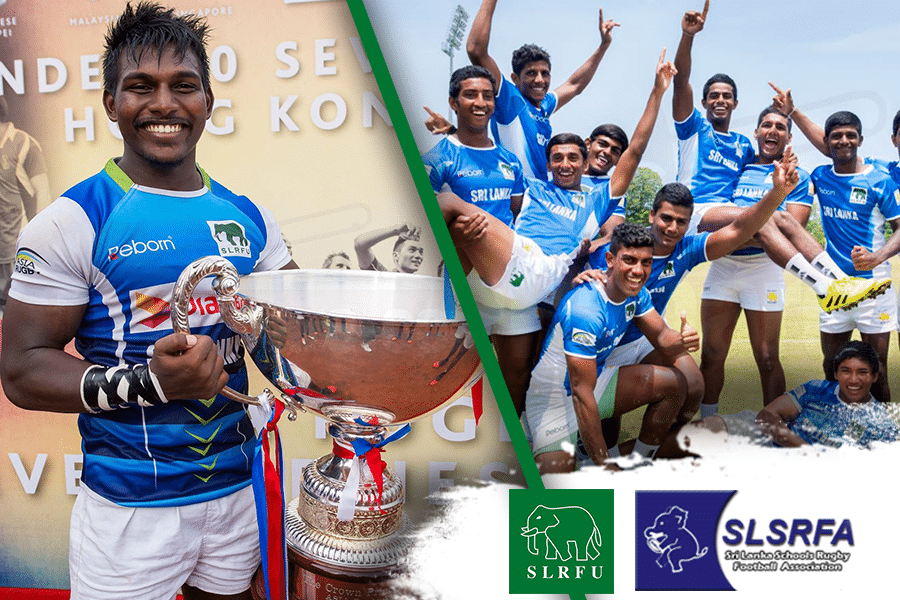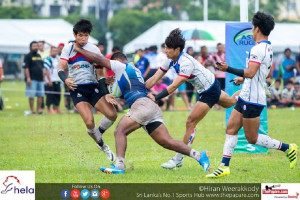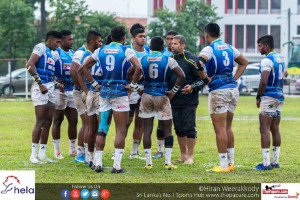The shorter version of the game, which is now an Olympic sport, has been growing in popularity around the globe. It has been also been quite a sensational year so far for Sri Lanka, at least in the junior levels, as the game of 7s has taken the Island nation into the Asian spot light.
Performances looking up
The Sri Lanka U20 team won the Asian 7s series for the first time in history a month ago. Then the U18s went unbeaten in Chinese Taipei to clinch the Asian Championship trophy a couple of weeks ago. Last weekend, the Sri Lanka national rugby team(Tuskers), significantly weakened by a string of injuries to experienced players, put on a fantastic performance in the final of the Asia 7s series first leg in Hong Kong, ultimately losing out to the hosts, 22 – 17.
The local rugby fraternity would know that the national team toured Hong Kong minus some big names including Fazil Marija and Sudharshana Muthuthanthri. Hong Kong has been Sri Lanka’s stumbling block for many years now as the Tuskers are yet to beat them in an international competition. Even at the junior levels, the U18’s and U20’s could not beat the Hong Kong teams in the past couple of tournaments, despite winning sporadic titles.
Last weekend however, the senior Tuskers under acting captain Danushka Ranjan, almost pulled off the unthinkable when they led Hong Kong for some time during the final. Ranjan took on the responsibility of leading the team with enthusiasm and was very confident of success prior to leaving for Hong Kong.
Speaking with ThePapare.com before departure he stated “We almost beat Japan last year In Colombo, we have been so close to beating Hong Kong several times, I hope we can beat Hong Kong or Japan in this year’s series ”
Coming into the final to face a team they had never beaten, the team showed great strength of character and confidence in each other’s ability to play the way they did, pushing the favourites all the way.
Kevin Dixon, who captained the U20s, was quite a revelation on his senior debut. Despite his stature, he showed that he is not afraid of taking on the big guys in the middle as he made two try saving tackles last weekend. His try in the Cup semi-final when he took on a Chinese player almost 3 times his size was a typical demonstration of his skill and heart. Not so strangely he displays uncanny resemblance to his coach Matt Turner’s style of play for England and it is apparent that young Dixon will be donning the Tusker’s jersey for a while.
Jason Dissanayake scored 4 tries playing in the wing, a strategy which turned out to be a great move by Turner, who left the experienced wingers Dinusha Chathuranga and Kavindu Perera on the bench. Dulaj Perera was another who stood-out, stepping into veteran Fazil Marija’s shoes and showing great maturity during the course of the tournament. Tarinda Ratwatte also played sensibly, scoring 3 tries but he needs a bit more match experience to bring his game to the next level. The other youngster in the team, Omalka Gunarathne, used his strength in to good effect. However his decision making on the field, particularly could have been better. The kick and chase which worked well for him in the U 20 final against South Korea, did not work out for him in the final against Hong Kong.
Coming into the tournament, Sri Lanka’s main competitors were expected to be Japan and hosts Hong Kong. Japan, who has long been considered the best team in Asia, did not do well in the tournament last weekend. What needs to be noted though is that the defending champions Japan did not send their 1st string or even their 2nd string team but a group of University students. On the other hand Hong Kong prepared really well for this tournament, with some players who are part of the XV’s set-up pulling out of the XV’s tour to Kenya in order to prepare for this tournament.
In the two games in which Sri Lanka faced Hong Kong, the results were quite contrasting. In the pool game the Tuskers were over-powered 22 – 00 but then they nearly pulled off an upset in the finals, with the match ending with a score-line of 22 – 17 in favour of the hosts.
Even the Hong Kong coach Gareth Barber commended the efforts of the Tuskers saying that, “It was a good test and Sri Lanka played very well, their reaction to the ball was better than ours and their kick-off strategy put us under real pressure. We weren’t accurate enough and in fourteen minutes you lose a few of those and it’s a different game.” Barber further stated that Hong Kong showed commonsense and a good rugby brain and a good will to win”
Something that Sri Lanka apparently lacked.
Hong Kong beat their opponents without conceding a single point in the group games (105 points to 0). They beat Malaysia 36 – 00, Chinese Taipei 47 – 00 and Sri Lanka 22 – 00 whereas Sri Lanka beat Chinese Taipei 43 – 12, Malaysia 40 – 21 and lost to Hong Kong.
The Tuskers should have been able to do the same as Hong Kong and keep opposition scoreless but why do they give away tries? The defense is a big issue that needs to be rectified.
Sevens is a funny 14 minute game in which anything can happen, just take for example the two matches that Sri Lanka played against Hong Kong. Hong Kong beat Spain in the pool game at the Olympic Qualifiers in Monaco but Spain beat Samoa 22 – 19 in the final to crush Samoa’s Olympic dream. Prior to that Samoa had won the World 7s series in Paris for the first time beating Fiji 29 – 26 points, proving yet again that 7s is an unpredictable sport.
It will be surprising if Japan sends the same team for the second leg of the Asia 7s series in South Korea on the 24th & 25th September and the third leg on the 15th & 16th October in Sri Lanka. Japan has already qualified for the World 7s series, is it possible that they aren’t giving enough importance to defending their Asian title?
Sri Lanka rugby – where to now?
Without a doubt the talent is growing in the country and as we saw last weekend, the injury replacements are more than capable of taking on their international opponents. Moreover, if Sri Lanka Super Sevens Series becomes an annual event, it will help the country’s game immensely.
One of the major problem is that professionalism is lacking in terms of contracting a group of players to specialize in the 7s format, many are brought into the 7s team based on their performances in the XV’s format or on a singular tournament.
At the end of the club season last year many players complained about not getting the proper support in order to recover from injuries sustained during the season.
It is sad that some players who could have toured Hong Kong for the Asian 7s series chose to train with their local club in the XVs format ahead the West Asia Rugby Championship that is scheduled to be held in the UAE.
The Sri Lanka Rugby Football Union (SLRFU) should made a firm decision on contracting player on a country-first basis. It is disappointing to see that whilst there are two more important outings in the Asia 7s series for the national team, some players are training for the XV’s format with their clubs.
Even the great All Black Sonny Bill Williams who was a part of the World Champion team in 2015 couldn’t do well for the New Zealand 7s at the Olympics after training for almost 6 months in the shorter version. The sevens sensation Srinath Sooriyabandara missed out on the Hong Kong 7s due his doctors advising him not to play contact rugby as a result of him sustaining a concussion at the recently concluded Super 7s. How is it then that he is playing in the UAE? XV’s is a more dangerous game than sevens. The Kandy trio Danushka Ranjan, Danush Dayan and Jason Dissanayake also travelled straight from Hong Kong to UAE, instead of preparing for the 2nd leg of the Asian 7s series.
The SLRFU appointed Inthi Marikar as the high performance director, and Marikar did follow the schools’ rugby season and observed the U18s and U20s players’ strengths and weaknesses. With his guidance, the junior teams made history but with the club rugby season approaching, the SLRFU should immediately contract these junior players before they are contracted do full time duties with the clubs.
If funds are a concern for the SLRFU, they have to aggressively re-do their marketing strategy.
According to junior coaches Sudath Sampath (U20 coach) and MJM Mushtaq (U18 coach) Inthi Marikar, SLRFU high performance director has had a massive impact on the junior levels trying to make the junior rugby similar to the All Blacks academy system.
Oh dear SLSRFA (Sri Lanka Schools Rugby Football Association)
As all this is happening at a national level, the governing body for schools’ rugby which has been conducting so many tournaments for so long, cannot seem to do a professional job of organizing an event. There was a blunder in the U18 fixtures recently which forced S. Thomas’ College to protest and ultimately withdraw from the tournament. The frequent changes in venue is another issue that does not reflect well on the organizing skills of the administration.
The U16 final between St. Peter’s and Royal was played after 6.30pm, at which time you could hardly see the ball and as a result very little play was possible in the second half. The SLSRFU has been lobbying to take control of the SLSRFA matter for a while now. Many questions arise. If the governing body (SLRFU) takes over schools rugby will they be using the same man-power? Would that solve the problem? Will there be a different strategy brought forth with former players given a role in developing the rugby? Would add quality as opposed to having school masters doing the job?




















